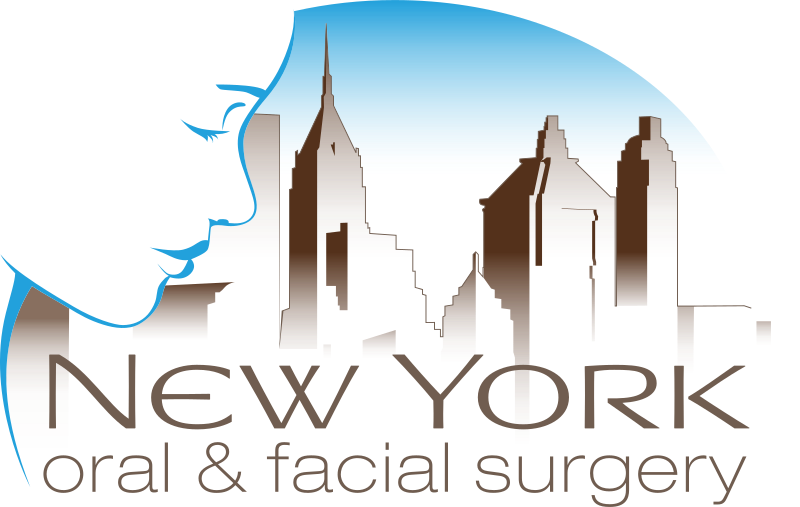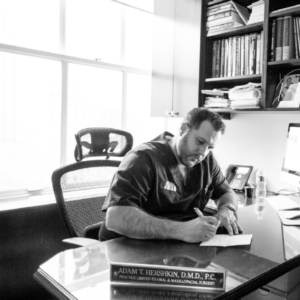What Are Wisdom Teeth?
Third molars are commonly referred to as wisdom teeth. They are usually the last teeth to develop and are located in the back of your mouth, behind your second molars. Their development is usually completed between the middle teenage years and early twenties, a time traditionally associated with the onset of maturity and the attainment of wisdom.
What Is An Impacted Tooth?
Although most people develop and grow 32 permanent adult teeth, many times their jaws are too small to accommodate the four wisdom teeth. When inadequate space prevents the teeth from erupting they are called impacted. This indicates their inability to erupt into the proper position for chewing and cleaning.
Types Of Impactions
We will need to see you for a consultation to determine if you will benefit from wisdom tooth removal. A special x-ray of your mouth and jaws (panorex) will be taken to determine if your wisdom teeth are impacted, if there is room for them to erupt, and how difficult it will be to have them removed.
- Soft Tissue Impaction: There is not enough room to allow the gum tissue to retract for adequate cleaning of the tooth.
- Partial Bony Impaction: There is enough space to allow the wisdom tooth to partially erupt. However, the tooth cannot function properly in the chewing process, and creates cleaning problems, among others.
- Complete Bony Impaction: There is NO space for the tooth to erupt. It remains embedded in the jaw bone or if even partially visible requires complex surgical techniques for removal.The impacted wisdom tooth may also be in an unusual position and difficult to remove. This situation can also arise when the shape or size of the jaw bone and other facial structures make removal of this tooth significantly more complex.
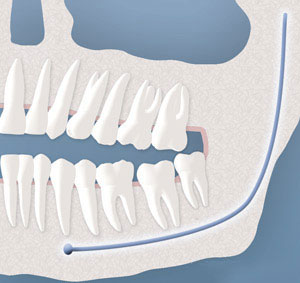 Soft Tissue
Soft Tissue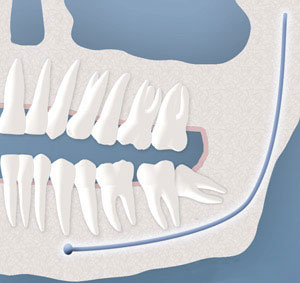 Partial Bony
Partial Bony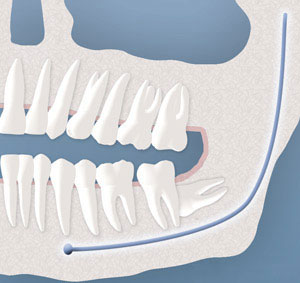 Complete Bony
Complete Bony
What Are The Causes of Impacted Wisdom Teeth?
Wisdom teeth are considered to be impacted when there is not enough space in the jaw bone and/or soft tissues to the teeth to erupt into the mouth. When they are impacted, normal hygiene is either difficult or impossible – even for the hygienist. This leads to most of the detrimental issues caused by impacted wisdom teeth.
What Are The Signs And Symptoms of Impacted Wisdom Teeth?
Wisdom teeth that are visibly under the gums and not fully visible are considered to be impacted. These teeth are sometimes asymptomatic but still require removal so that adjacent teeth, bone and soft tissue do not become damaged or diseased. When symptomatic, they may cause pain, swelling or drainage of pus. Other symptoms associated with impacted wisdom teeth are headaches, TMJ pain and difficulty chewing.
What Are The Risk Factors of Impacted Wisdom Teeth?
Having wisdom teeth that are in a position in which they are not able to be properly cleaned leads to decay (of the wisdom tooth and/or the adjacent tooth), swelling, infection and bone loss. In more rare instances cysts or tumors can develop around an impacted tooth.
What Are Possible Treatments For Impacted Wisdom Teeth?
Treatment of impacted wisdom teeth is limited to either extraction or coronectomy. Coronectomy is removal of only the upper part of the tooth in extreme cases where the roots will be very difficult and/or dangerous to remove completely.
Are There Preventative Steps or Measures To Avoid Impacted Wisdom Teeth?
There is no way to avoid having impacted wisdom teeth but removing them as a teenager when the roots are only partially formed is recommended. This is the easiest time to remove impacted wisdom teeth. A young, healthy patient will heal quickly and will have a lower incidence of complications. Partially developed teeth do not have a complex root structure yet and thus are less dangerous and less traumatic to remove.
What Are The Risks If Impacted Wisdom Teeth Are Left Untreated?
The risks of leaving impacted wisdom teeth untreated are pain, swelling, infection, decay, bone loss, damage to adjacent teeth and formation of cysts or tumors. Furthermore, older patients often have medical conditions that complicate surgery and anesthesia. Older patients have a higher incidence of post-operative complications and take longer to heal than younger patients.
Are There Other Conditions That Relate To Impacted Wisdom Teeth?
Related conditions to impacted wisdom teeth are dental decay, periodontal disease, infection and development of cysts and tumors.
Key Takeaways About Impacted Wisdom Teeth (Top 3-5 points to remember from everything)
- Don’t wait until it is an emergency to remove impacted wisdom teeth
- Remove impacted wisdom teeth before they are finished developing
- If you can’t clean them, they should be removed
Recommended Next Steps
Make an appointment for an examination and X-rays.
